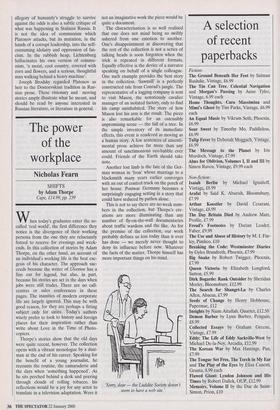The power of the workplace
Nicholas Fearn
SHIFTS by Adam Thorpe Cape, £14.99, pp. 239
When today's graduates enter the so- called 'real world', the first difference they notice is the divergence of their working persona from the one they are reluctantly forced to reserve for evenings and week- ends. In this collection of stories by Adam Thorpe, on the other hand, an account of an individual's working life is the best exe- gesis of his character. The approach suc- ceeds because the writer of Ulverton has a fine ear for legend, but also, in part, because his stories are set in the days when jobs were still trades. There are no call- centres or sales conferences in these pages. The inanities of modern corporate life are largely ignored. This may be with good reason, for they are perhaps a fitting subject only for satire. Today's authors wisely prefer to look to history and foreign places for their inspiration rather than write about Love in the Time of Photo- copiers.
Thorpe's stories show that the old days were quite recent, however. The collection opens with a vibrant monologue by a dust- man at the end of his career. Speaking for the benefit of a young journalist, he recounts the routine, the camaraderie and the days when 'something happened'. As he sits perched behind a desk and peering through clouds of rolling tobacco, his reflections would be a joy for any actor to translate in a television adaptation. Were it not an imaginative work the piece would be quite a document.
The characterisation is so well realised that one does not mind being so swiftly ushered from one emotion to another. One's disappointment at discovering that the rest of the collection is not a series of talking heads is soon forgotten when the trick is repeated in different formats. Equally effective is the device of a narrator speaking on behalf of a single colleague. One such example provides the best story in the collection. 'Sawmill' is a perfectly constructed tale from Conrad's jungle. The representative of a logging company is sent to visit Mason, the notoriously cavalier manager of an isolated factory, only to find his camp uninhabited. The story of how Mason lost his arm is the result. The piece is also remarkable for an ostensibly unpromising scene — the fall of a tree. In the simple inventory of its immediate effects, this event is rendered as moving as a human story. A few sentences of unsenti- mental prose achieve far more than any amount of sanctimonious eco-babble ever could. Friends of the Earth should take note.
Another lost limb is the fate of the Ger- man woman in 'Iron' whose marriage to a blacksmith many years earlier converges with an out of control truck on the porch of her house. Postwar Germany becomes a surprisingly engaging setting in a story that could have seduced by pathos alone.
This is not to say there are no weak num- bers in the collection, but Thorpe's cre- ations are more illuminating than any number of fly-on-the-wall documentaries about traffic wardens and the like. As for the premise of the collection, our work probably defines us less today than it ever has done — we merely never thought to deny its influence before now. Whatever the facts of the matter, Thorpe himself has more important things on his mind.
`Sony, dear — the Luddite Society doesn't seem to have a web site.'


























































 Previous page
Previous page